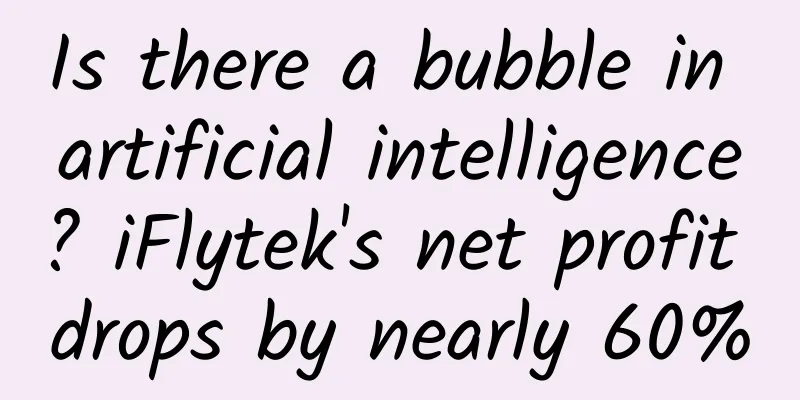Is there a bubble in artificial intelligence? iFlytek's net profit drops by nearly 60%

|
Since last year, artificial intelligence has quickly come to the fore and is now regarded as the next technological wave. It has attracted much attention from the political, business and scientific communities. my country has also issued an artificial intelligence development plan, adding fuel to the already extremely popular artificial intelligence, heralding the arrival of the best era of development. A large number of startups have poured in, and related investments have also soared. However, artificial intelligence is overly mythologized at this stage, and some companies are even dazzled by sci-fi visions. The phrase "committed to" makes a company instantly tall and majestic, and the valuations of many startups have skyrocketed, instantly entering the ranks of unicorns. In a word, the bolder the people, the more productive the land, and the more they are used to the extreme in the field of artificial intelligence. Although artificial intelligence is in the limelight, on this road to poetry and the distance, it is particularly important to see the direction of progress from the bubble. In particular, entrepreneurial and innovative companies engaged in the field of AI should be wary of bubbles and eliminate gimmicks and hype. The industry needs to be solid and stable to promote the development of AI technology and commercial transformation. 1. iFLYTEK iFlytek's 2017 semi-annual report shows that the company's revenue was RMB 2.12 billion. Although the revenue grew by 43.79% year-on-year, the net profit attributable to shareholders of the listed company was only RMB 107 million, a year-on-year decline of 58.11%. Last year's non-operating income was RMB 80.12 million, mainly including government subsidies and investment income. Without this income supplement, iFlytek's net profit in the first half of the year was affected. According to iFlytek's semi-annual report, the education industry and system integration accounted for 57.55% of the total revenue. In addition, due to the establishment of cooperative relationships with 27,000 smart hardware customers in terms of human-computer interaction solutions and services, the revenue from human-computer interaction services increased significantly, up 131.47% year-on-year, and grew rapidly. However, the estimated contribution of each customer is 7,285 yuan, and the base is still small. Secondly, smart hardware products brought iFlytek a revenue of 26.97 million yuan, but it did not release specific sales data for Ding Dong speakers. It only stated that online sales on JD.com ranked first in the WiFi speaker category, accounting for more than 80% of sales. However, the 2016 annual report showed that sales of Ding Dong speakers were less than 100,000. Although media reports say that Dingdong smart speakers have sold 1 million units since their launch in 2015, the monthly shipments in 2016 were less than 10,000 units, which is embarrassing. The domestic smart speaker market is not optimistic, especially this year, when a "hundred-box war" has emerged, including Lenovo, Xiaomi and many other players. The market competition is increasingly fierce, and it is extremely difficult for Dingdong smart speakers to achieve rapid growth. In addition, iFlytek's proud voice technology has been invaded by giants such as BAT. At the same time, many innovative companies in this field are also in the growth stage and are gradually narrowing the technological gap with iFlytek. iFlytek also stated that major companies have increased their R&D investment in the development of new technologies and new products, but the industrialization and commercialization of technology have many uncertainties. 2. SenseTime Last month, SenseTime announced the completion of a $410 million Series B financing round, with a valuation of over $1.5 billion. This news set off a sensation in the industry, but according to iFlytek's 2015 annual report, the company held 0.49% of SenseTime Group's shares, worth 6.3 million yuan. Based on this calculation, SenseTime's valuation during this period was approximately 1.3 billion yuan (approximately $200 million). Since then, iFlytek has not increased its investment, but its 2016 annual report shows that after the dilution of its shareholding, its shareholding ratio is 0.49%. At the same time, the proportion in the 2017 semi-annual report remains unchanged. If calculated based on SenseTime’s valuation of US$1.5 billion, then in less than three years, iFlytek’s return on investment in SenseTime has exceeded 7.5 times, that is, the early investment of RMB 6.3 million is now worth RMB 47.25 million. (III) UBTECH In the 2016 Spring Festival Gala, 540 robots performed on stage, which brought UBTECH both fame and fortune. Its valuation also soared. As early as last year, its valuation reached 1 billion US dollars, making it a unicorn enterprise in the field of artificial intelligence. This year, its valuation was even more astonishing, reaching 5 billion US dollars. However, according to iFlytek's 2017 semi-annual report, the company holds 0.89% of UBTECH's shares, worth 19.16 million yuan, and its estimated valuation is about 2.2 billion yuan (about 330 million US dollars). iFlytek first invested in UBTECH in 2015, with an investment of approximately RMB 5.75 million and a 1% stake. Based on this data, the valuation of UBTECH in 2015 was approximately RMB 575 million (approximately USD 86 million). In 2016, iFlytek invested an additional RMB 13.41816 million, totaling RMB 19.1688 million. This time, the diluted shareholding accounted for 0.89%, which can be inferred to be approximately RMB 2.2 billion (approximately USD 330 million), which is far from the valuation of up to USD 1 billion reported last year. Conclusion All walks of life will be changed by AI, especially as Google, Microsoft, BAT and others are making greater strides in the field of artificial intelligence, pushing artificial intelligence to become an infrastructure like hydropower, making AI technology ubiquitous, penetrating and affecting all walks of life, and even driving the development of the world economy, bringing tremendous changes to the world. However, we should think rationally behind the current enthusiasm. Especially as a start-up, it can become a unicorn after only a few years. It has to be said that the bubble is getting bigger and bigger. It is undeniable that some start-ups will falsify financing data, especially start-ups with a valuation of more than 1 billion US dollars. There must be a valuation bubble. It’s just that it is extremely difficult for the outside world to determine whether there is falsification. However, we still hope that the atmosphere of exaggeration will not spread. Some well-known investors have even launched an initiative to resist start-ups from falsely reporting financing amounts. As a winner of Toutiao's Qingyun Plan and Baijiahao's Bai+ Plan, the 2019 Baidu Digital Author of the Year, the Baijiahao's Most Popular Author in the Technology Field, the 2019 Sogou Technology and Culture Author, and the 2021 Baijiahao Quarterly Influential Creator, he has won many awards, including the 2013 Sohu Best Industry Media Person, the 2015 China New Media Entrepreneurship Competition Beijing Third Place, the 2015 Guangmang Experience Award, the 2015 China New Media Entrepreneurship Competition Finals Third Place, and the 2018 Baidu Dynamic Annual Powerful Celebrity. |
<<: Car as a Service, will you still need a car in the future?
Recommend
Channel Operation | If I give you 10 million, how would you spend it?
I believe that those who are involved in promotio...
Trump wants to cancel subsidies for electric vehicles. Why did Musk, who made 4.6 billion from it, say he was willing?
Just like sodium meets water, when Musk meets Tru...
Apple releases dual system update!
This morning, Apple pushed the iOS 17.1 Beta 3 up...
Accurate CPA profit-making gameplay, a money-making project suitable for novices
I have found that many of my friends have the hab...
Nature Trumpet丨When the Asian river dolphin plays with the snake, an indescribable scene happens...
Welcome to the 8th issue of the Nature Trumpet co...
Can’t write information flow advertising copy? There is a template here, just use it!
Many friends often complain to me: " Informa...
The 16th astronauts of Shenzhou 100 exited the spacecraft safely! Some photos of the return capsule are black and some are gold. What's going on?
Shenzhou 16 returned home successfully, and many ...
5 core strategies for brand promotion at Station B
Nowadays, Bilibili has become one of the most pop...
How did you get your first 1,000 users? Start with the stupid things!
The story begins with hotmail. In 1996, two engin...
Where is the way out for self-media in 2017?
Many operators now have a feeling: the number of ...
Uncovering the secrets of Asia’s “water tower”: majestic yet fragile
Your browser does not support the video tag The Q...
What qualifications are required for a knowledge-based payment app? What are the features?
WeChat, as the largest traffic portal on mobile t...
Can you believe that the beer bottle in the movie is made of sugar?
Review expert: Meng Meng, associate researcher at...
A collection of top-notch front-end special effects resources#001
1. Front-end tree diagram -- zTree -- jQuery tree...
Product analysis of soul, Tantan and Jimu social apps!
In 1943, Abraham Maslow proposed the famous Maslo...









